
"Ramblin' Rose" is a 1962 popular torch song written by brothers Noel Sherman (words) and Joe Sherman (music) and popularized by Nat King Cole. The recording by Nat King Cole reached No. 2 on the Billboard Hot 100 chart in 1962.
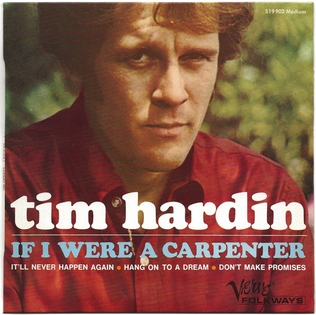
"If I Were a Carpenter" is a folk song written by Tim Hardin in the 1960s, and re-recorded with commercial success by various artists including Bobby Darin, The Four Tops and Johnny Cash. Hardin's own recording of the piece appeared on his 1967 album Tim Hardin 2. It was one of two songs from that release performed by Hardin at Woodstock in 1969. The song, believed by some to be about male romantic insecurity, is rumored to have been inspired by his love for actress Susan Morss, as well as the construction of Hardin's recording studio.

"Break It to Me Gently" is a pop song written by blues musician Joe Seneca with lyrics by Diane Lampert. Both Brenda Lee and Juice Newton were met with considerable success with their versions of the song.

"Da Doo Ron Ron (When He Walked Me Home)" is a song written by Jeff Barry, Ellie Greenwich and Phil Spector. It first became a popular top five hit single for the American girl group the Crystals in 1963. American teen idol Shaun Cassidy recorded the song in 1977 and his version hit number one on the Billboard Hot 100 chart. There have also been many other cover versions of this song, including one by the songwriters Jeff Barry and Ellie Greenwich themselves, performing as the Raindrops.

"Ya Ya" is a song by Lee Dorsey. The song was written by Dorsey, C. L. Blast, Bobby Robinson, and Morris Levy. Levy's participation in the writing has been called into question; the Flashback release of the single lists only Dorsey and Blast as writers, as do the liner notes to the American Graffiti soundtrack.

"Black Is Black" is a song by the Spanish rock band Los Bravos, released in 1966 as the group's debut single for Decca Records. Produced by Ivor Raymonde, it reached number two in the UK, number four in the US, and number one in Canada. With the recording's success, Los Bravos became the first Spanish rock band to have an international hit single. A dance remix was released as a single in 1986.
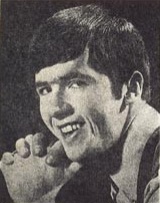
Branko Bernard Miler, better known by his stage name Tony Cole, was an Australian singer and songwriter.
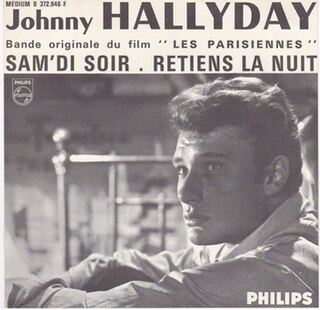
"Retiens la nuit" is a song by French singer Johnny Hallyday from his 1961 studio album Salut les copains. It was also released as an EP in February 1962 and as a single two months prior. The song was also featured in the 1962 French comedy-drama anthology film "Les parisiennes", which starred Hallyday.
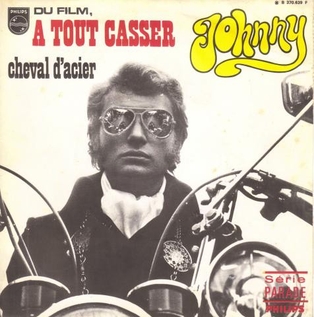
"À tout casser" is a song by French singer and actor Johnny Hallyday. It was used in the opening title sequence of the 1968 film of the same name. Hallyday also released it as a single and on his 1968 studio album Jeune homme The B-side "Cheval d'acier" also appears in the film, where Hallyday performs it on stage.
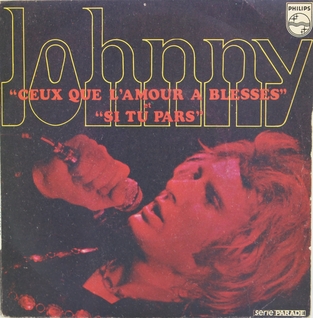
"Ceux que l'amour a blessés" is a song by French singer Johnny Hallyday. It was released as a single in January 1970.

"Comme un corbeau blanc" is a song by French singer Johnny Hallyday. It was released as a single in February 1973 and included on his 1973 studio album Insolitudes.
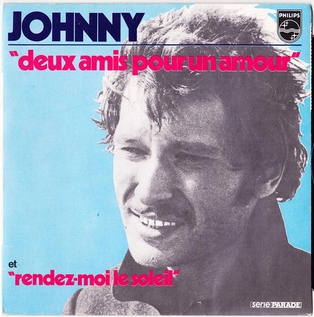
"Deux amis pour un amour" is a song by French singer Johnny Hallyday. It was released as the second and penultimate single off of his 1970 studio album Vie.

"Ma guitare" is a song by French singer Johnny Hallyday from the 1963 film D'où viens-tu Johnny? It was also released on a double A-side single.
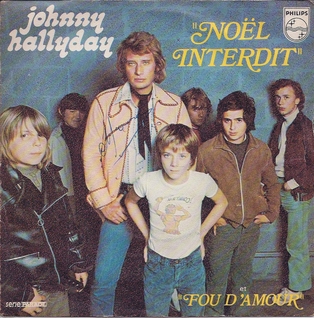
"Noël interdit" is a Christmas song by French singer Johnny Hallyday. It was released as a single in November 1973.

"Prends ma vie" is a song by French singer Johnny Hallyday. In March 1974 it was released as the lead single off of Hallyday's 1974 studio album Je t'aime, je t'aime, je t'aime.
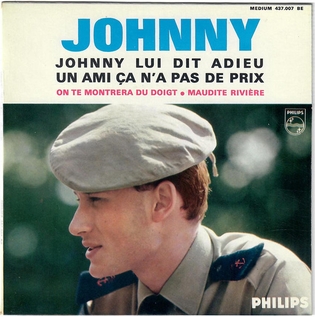
"Un ami ça n'a pas de prix" is a song by French singer Johnny Hallyday. It was released on an EP titled "Johnny lui dit adieu / Un ami ça n'a pas de prix" in January 1965.

"Makin' Love" is a song written and originally released by American country singer Floyd Robinson. He released it as a single in 1959 and was featured on his self-titled debut album the following year.
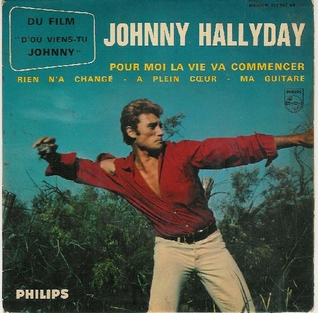
"Pour moi la vie va commencer" is a song by written by French singer-songwriter Jean-Jacques Debout and performed by French singer Johnny Hallyday. It was released in October 1963, coinciding with the release of the film "D'où viens-tu Johnny", starring Hallyday and fellow singer and future wife Sylvie Vartan, of which the song is featured on.

"Souvenirs" is a song written by Cy Coben and originally recorded and released by American singer Barbara Evans backed by Canadian composer Mort Garson and his Orchestra, the song was released in April 1959. The song failed to chart, peaking at 111 in the Bubbling Under Hot 100 in June 1959. Two successful non-English covers would follow, such as in German by expatriate American singer Bill Ramsey in June of that same year, and the most successful in French by French singer Johnny Hallyday, released in June 1960.

"We Say Yeah" is a song originally performed by Cliff Richard & The Shadows. It was initially released in December 1961 on "The Young Ones" soundtrack album and a few weeks later the B-side to "The Young Ones" single. Both reached number 1 in their respective UK charts. In France however, it was "We Say Yeah" instead of "The Young Ones" that made the singles chart, reaching number 14.






















